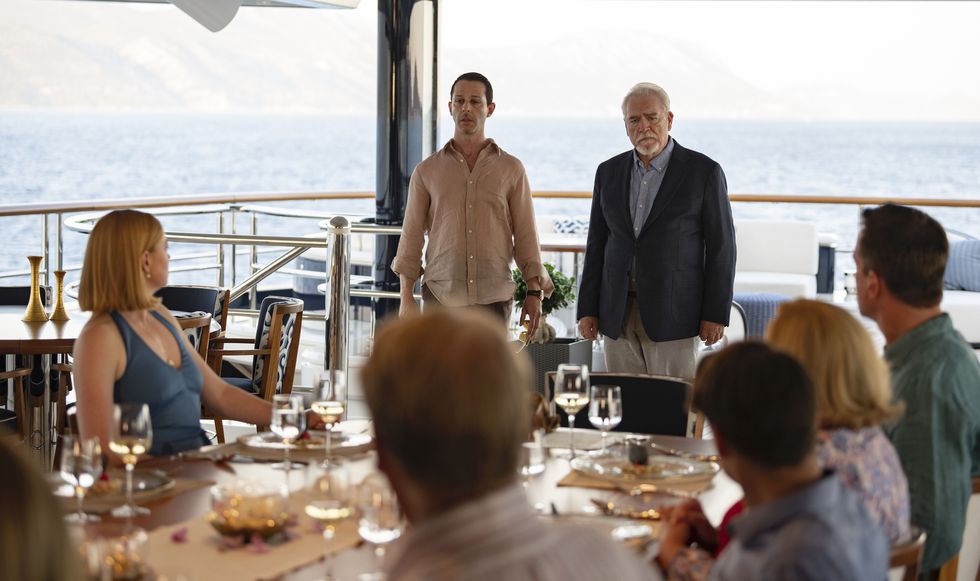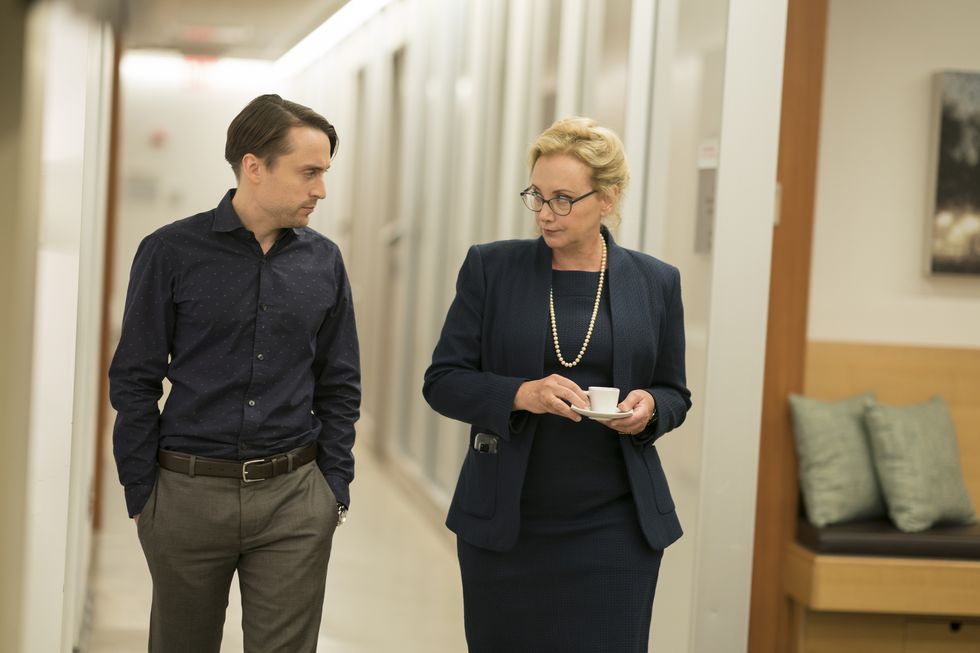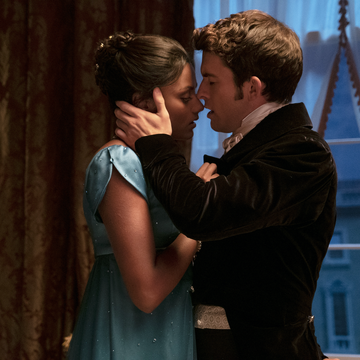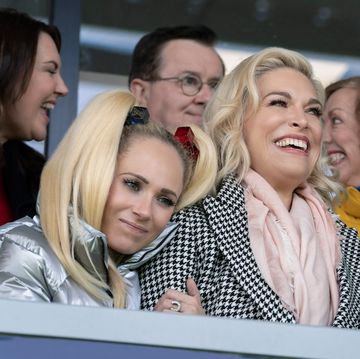Spoilers below.
Ever since Succession’s fourth season debuted in March, fans have been “pre-grieving” the finale, to borrow a term from Roman Roy. We knew in advance that HBO’s most prestigious prestige drama was coming to an end. Trailers and posters proudly advertised it as “The Final Season.” And now, as of Sunday night, it’s really over: Patriarch Logan Roy, who pitted his children against each other like gladiators in a battle to control the family empire, is entombed in a $5 million mausoleum. Kendall, Logan’s heir not-so-apparent, lost the vote to block a deal after Shiv, true to her name, stabbed him in the back. As a result, Waystar Royco wound up in the hands of GoJo, an “everything app” run by billionaire Swede Lukas Matsson with Tom Wambsgans as his puppet “pain sponge” CEO.
The Roy kids have officially fucked off. And we, the viewers, are inconsolable, staring at our TV screens and wondering if they are in there.
More From ELLE

Amid an ever-widening gap between the rich and the poor (and growing calls to “eat the rich”), plenty of American television shows have taken aim at the 1 percent. With offerings like Succession, The White Lotus, and Big Little Lies, HBO has turned skewering the ultrarich into a business model. But nobody has done it quite like Succession, which has won 13 Emmys thus far, with more likely to come. Beyond the critical acclaim, the show has electrified fans in unprecedented ways, particularly if you consider that it was a highbrow drama most often compared to King Lear. Yet, when critics wonder which of the Roy children is going to “win a kiss from daddy” in any given week, they are quoting a YouTube remix of the show’s theme song that went viral four years ago. Each character has developed its own rabid fandom, circulating memes and TikTok fancams: Kendall and Greg are both babygirl; Shiv was Mother before it was even revealed that she was pregnant. Beware the Conheads and the Roman Girlies. And mazel tov to the Wambsgans Stans.
What was it about this show? Yes, the writing crackled off the page and the actors, even the ones playing smaller roles (Rava and Jess: I see you), left it all on the field every week. Succession was nothing if not topical: plotlines, like the election of a neofascist propped up by a right-wing news organization, bore an eerie resemblance to some news events, and seemed to predict others. “Roman Roy” trended on Twitter following the explosion of one of Elon Musk’s SpaceX rockets in April because it was foreshadowed by a fictional rocket-launch debacle in the show’s first season. The same month, the Princess of Wales was called out in the press for carrying a “ludicrously capacious” handbag on a recent visit to Birmingham, echoing Tom’s description of the Burberry tote carried by Greg’s date in the season 4 premiere. When Tucker Carlson was fired by Fox News, fans suggested his replacement should be Kerry, Logan’s assistant-slash-girlfriend (a.k.a. “Chuckles the Clown”).
But the real reason Succession has made such an enduring cultural impact has less to do with the writers’ talent for predicting the news than it has to do with the last words Logan Roy ever uttered to his children: “I love you, but you are not serious people.”
To Logan, being a serious person meant being like him, a self-made man who overcame great odds—who “built and acted,” as Kendall put it in his eulogy—to bend the world to his will. His children, by contrast, were a bunch of nepo babies cruising around in a Bentley clown car fueled by their insatiable thirst for approval from someone ill-equipped to give it. (Whether Logan had any responsibility for this state of affairs never seemed to occur to him.)
But here’s the thing: We loved the Roy kids precisely because they were not serious people. Without their father as their lighthouse, they flailed around, plotting and scheming, trying to figure out what “L to the OG” would do, but never quite getting it right. We were able to laugh at their incompetence—“You thought you were dad. You tried to dad it,” Kendall tells Roman in the penultimate episode—while empathizing with their desire to be seen. That’s the high-wire act that creator Jesse Armstrong, whose previous shows were comedies, managed to pull off. Because Succession may have trafficked in weighty themes, the actors’ emotional performances may have occasionally moved us to tears. But at its core, it was a serious show about unserious people, a comedy skulking around in a “stealth wealth” Loro Piana suit.
Like most comedic characters, the Roy kids didn’t evolve or change, despite all they had been through. When we see Kendall in the last frame of the finale, we know he is still a junkie, staring at the water and thinking of his next fix. Shiv, back at Tom’s side, is still quietly working all the angles. Nihilistic Roman is alone with his martini, bandaged but struggling to feel anything at all. Connor, bless his heart, is the ultimate failson, having spent around $100 million to become the putative Ambassador to Slovenia. And it’s not just the individual characters. The writers also nurtured the development of unlikely duos that delighted us every week: Gerri and Roman titillated with their sexual banter; “Disgusting Brothers” Tom and Greg found themselves locked in a codependent relationship that fans set to Taylor Swift songs; the old-guard “power couple” Frank and Karl, Waystar Royco’s vice-chairman and CFO, respectively, stole scenes with their caustic observations, musing in the finale that they should have “slit [Tom’s] throat in the cradle.” After the credits rolled, what remained were the meme-worthy creative insults, the zingers and the physical comedy. Who among us can ever forget Tom pelting Greg with water bottles in Season 2, or Shiv cutting loose on the dance floor in Season 3? Anyone up for a game of “boar on the floor”?
Ultimately, Succession was a story about how capitalism is eating American democracy. The Roy kids, cossetted in luxury and insulated from the consequences of their decisions, are the last people who should be running a business so powerful that it can swing a presidential election. Yet, all too often the nepo babies are the only ones available for these jobs. So much for the American ideal of a meritocracy where voters, not corporations, choose their leaders, and where talent matters more than money and family connections. Choosing to end the series with the Roy dynasty losing control, with the boardroom win going to a turtlenecked technocrat whose self-described philosophy is “privacy, pussy, pasta,” reminds us that the alternative may be even worse. But most importantly, in the immortal words of Jeremy Strong, it made sense, dramaturgically.
Rachel Dodes is a New York-based culture writer. Her first novel, The Memo, will be published in June 2024 by Harper Perennial.














